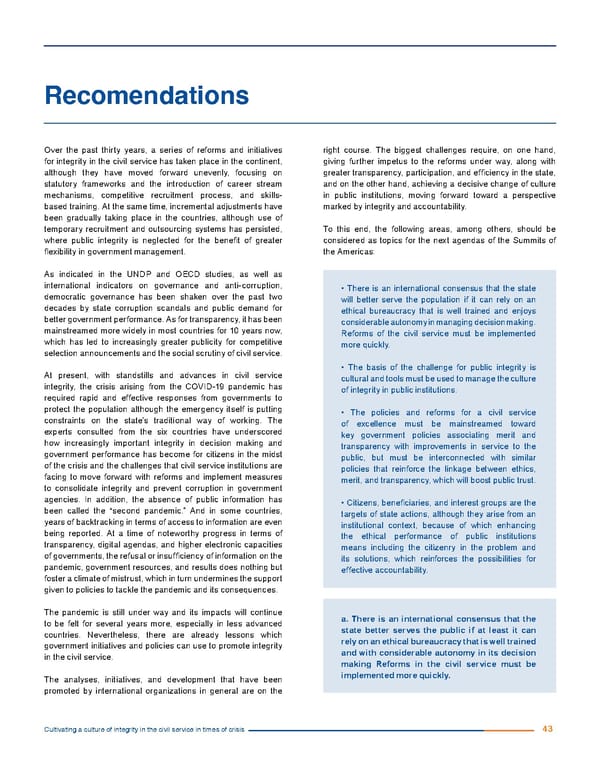Recomendations Over the past thirty years, a series of reforms and initiatives right course. The biggest challenges require, on one hand, for integrity in the civil service has taken place in the continent, giving further impetus to the reforms under way, along with although they have moved forward unevenly, focusing on greater transparency, participation, and efficiency in the state, statutory frameworks and the introduction of career stream and on the other hand, achieving a decisive change of culture mechanisms, competitive recruitment process, and skills- in public institutions, moving forward toward a perspective based training. At the same time, incremental adjustments have marked by integrity and accountability. been gradually taking place in the countries, although use of temporary recruitment and outsourcing systems has persisted, To this end, the following areas, among others, should be where public integrity is neglected for the benefit of greater considered as topics for the next agendas of the Summits of flexibility in government management. the Americas: As indicated in the UNDP and OECD studies, as well as international indicators on governance and anti-corruption, • There is an international consensus that the state democratic governance has been shaken over the past two will better serve the population if it can rely on an decades by state corruption scandals and public demand for ethical bureaucracy that is well trained and enjoys better government performance. As for transparency, it has been considerable autonomy in managing decision making. mainstreamed more widely in most countries for 10 years now, Reforms of the civil service must be implemented which has led to increasingly greater publicity for competitive more quickly. selection announcements and the social scrutiny of civil service. At present, with standstills and advances in civil service • The basis of the challenge for public integrity is integrity, the crisis arising from the COVID-19 pandemic has cultural and tools must be used to manage the culture required rapid and effective responses from governments to of integrity in public institutions. protect the population although the emergency itself is putting • The policies and reforms for a civil service constraints on the state’s traditional way of working. The of excellence must be mainstreamed toward experts consulted from the six countries have underscored key government policies associating merit and how increasingly important integrity in decision making and transparency with improvements in service to the government performance has become for citizens in the midst public, but must be interconnected with similar of the crisis and the challenges that civil service institutions are policies that reinforce the linkage between ethics, facing to move forward with reforms and implement measures merit, and transparency, which will boost public trust. to consolidate integrity and prevent corruption in government agencies. In addition, the absence of public information has • Citizens, beneficiaries, and interest groups are the been called the “second pandemic.” And in some countries, targets of state actions, although they arise from an years of backtracking in terms of access to information are even institutional context, because of which enhancing being reported. At a time of noteworthy progress in terms of the ethical performance of public institutions transparency, digital agendas, and higher electronic capacities means including the citizenry in the problem and of governments, the refusal or insufficiency of information on the its solutions, which reinforces the possibilities for pandemic, government resources, and results does nothing but effective accountability. foster a climate of mistrust, which in turn undermines the support given to policies to tackle the pandemic and its consequences. The pandemic is still under way and its impacts will continue a. There is an international consensus that the to be felt for several years more, especially in less advanced state better serves the public if at least it can countries. Nevertheless, there are already lessons which rely on an ethical bureaucracy that is well trained government initiatives and policies can use to promote integrity and with considerable autonomy in its decision in the civil service. making Reforms in the civil service must be The analyses, initiatives, and development that have been implemented more quickly. promoted by international organizations in general are on the Cultivating a culture of integrity in the civil service in times of crisis 43
 Cultivating a culture of integrity in the civil service in times of crisis. Page 50 Page 52
Cultivating a culture of integrity in the civil service in times of crisis. Page 50 Page 52